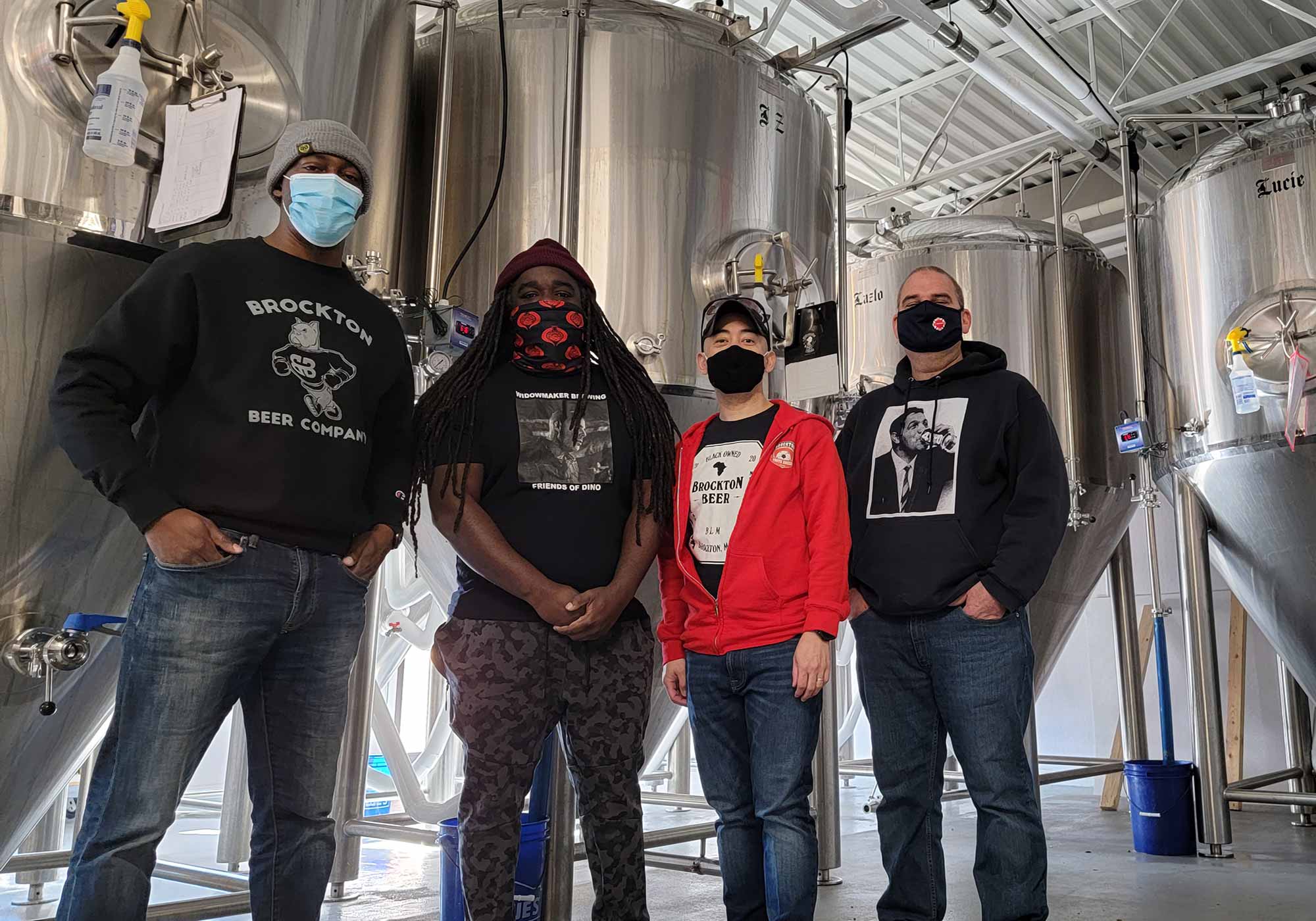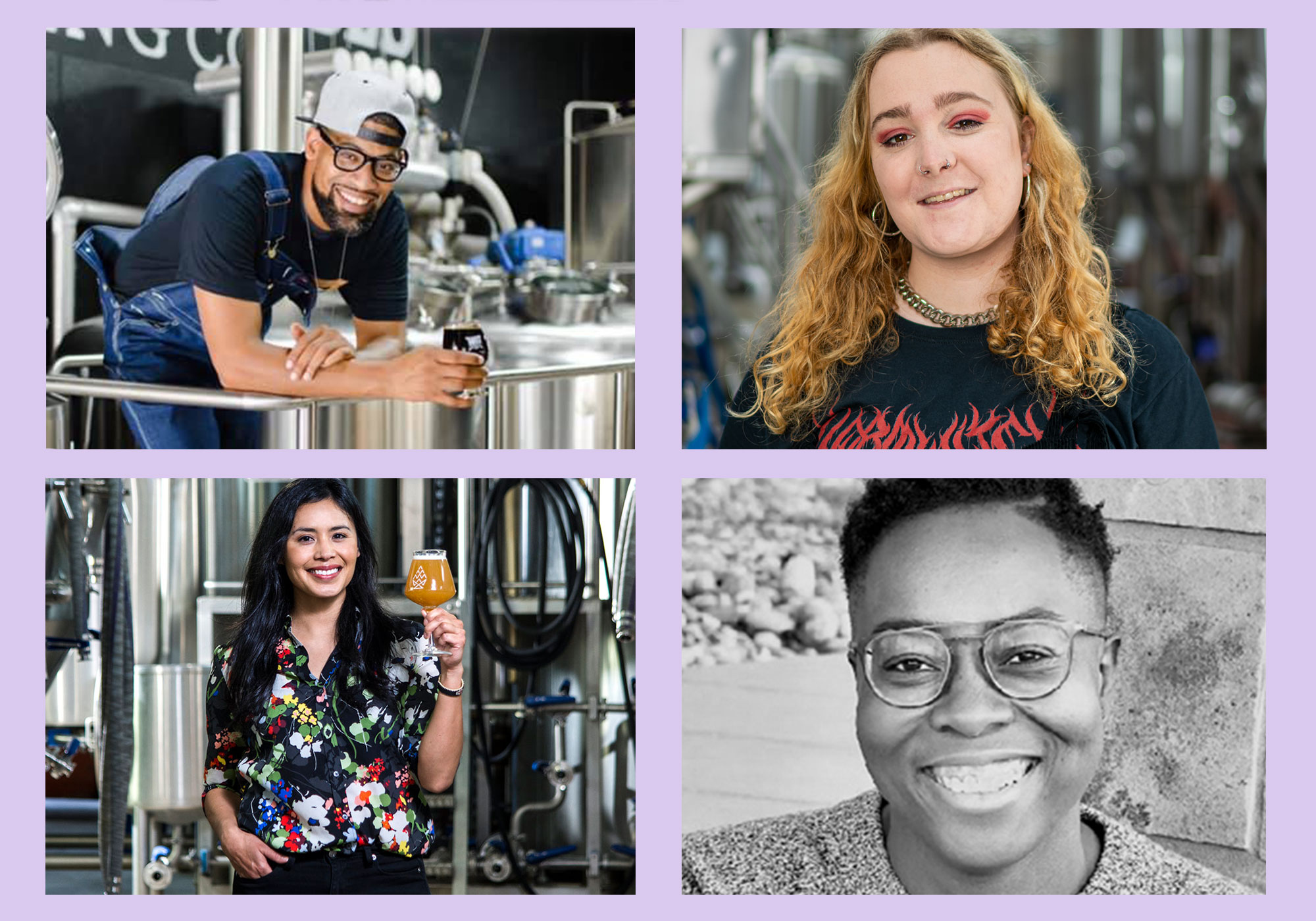Shop
How Haitian, Puerto Rican, Filipino, Canadian, Jamaican, Trinidadian, and Mexican-owned Brockton Beer Company Unites a Community
Beer has the power to unite. Brockton Beer Company proves it.
Ed Cabellon, co-founder of Brockton, Massachusetts’ nascent Brockton Beer Company, thinks about the brewery in terms of being a “catalyst for change.” By drawing crowds and making the city into a beer destination, Brockton Beer reflects Brockton’s diversity. And in turn reflects Cabellon, his three co-founders – Pierre Alexandre, Rowan Olmstead, and Eval Silvera, and their families. Who all together represent Haitian, Puerto Rican, Filipino, Canadian, Jamaican, Trinidadian, and Mexican culture.
“I think we’re a really good representation of the [Brockton] community,” Olmstead says. He’s 100% right: Brockton is a majority Black city as of 2020, and boasts a rich demographic of white, Asian, Cape Verdean, and Hispanic or Latinx residents, among others. By mirroring that makeup and by drawing inspiration from past and present for their beers, Brockton Beer can not only claim a role in Brockton’s revitalization, but also in fostering wider social change.
It’s not that Silvera, Cabellon, Alexandre, and Olmstead don’t want their beer to be fun, and most of all delicious. It’s not that they don’t take joy in making good beers with each other and fellow brewers. And, it’s not that they don’t value beer as a terrific social lubricant. “The more beer you drink, the more you like to have conversations,” Olmstead points out. But more than that Brockton Beer Company wants to have a dialogue for the purpose of finding common ground between their customers.
How Brockton Beer Company Started
“The brewing community is such a great community,” says Cabellon, and this, too, is true; craft beer is community, after all. It’s about people getting together, and working together, and enjoying frosty ones together, the reward for all the malting, mashing, boiling, and conditioning that goes into making beer. This dynamic is common in craft beer culture: Towns that lack a brewery of their own tend to wholeheartedly embrace them when they lay down roots in the neighborhood. In keeping with that sentiment, Alexandre echoes Cabellon’s feelings: “I have nothing but good things to say about the craft beer community as a whole, accepting us.”
In this way, Brockton Beer Company’s personal story is similar to the stories of countless breweries that become local cornerstones as soon as they go into operation. But Cabellon, Silvera, Olmstead, and Alexandre don’t need to lay down roots, per se, because before they began working on Brockton Beer Company, they already had those roots intact. The very idea of opening up a brewery in Brockton started over Friday night game nights. During these family gatherings the quartet, plus their spouses and friends,including Eval’s wife Latisha Silvera as well as co-founder Monica Renaud, got together for beers, fun, and a chance to commiserate after their kids’ bedtime.
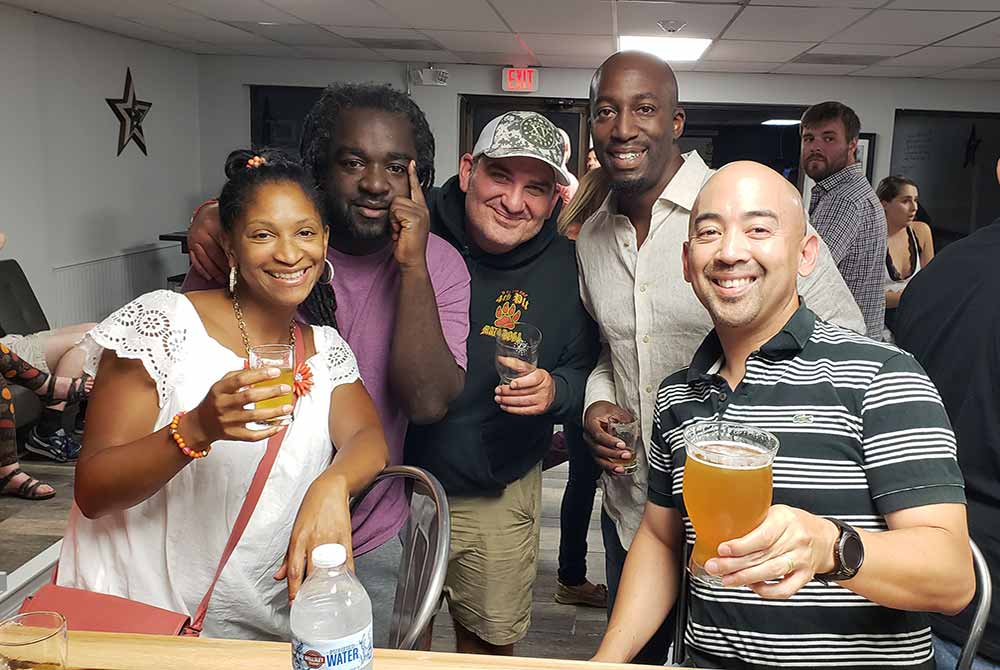
Photography courtesy of Brockton Beer Company
Shipping their children around from one school activity to another, to one after school activity to another, left the crew with little time for grown-up socialization. When they made room for that kind of camaraderie, they decided: Why not start a brewery of their own? The troupe’s mission was clear: Build a brewery in Brockton.
How Brockton Beer Company Creates Community Through Collabs
Cabellon understandably sees Brockton Beer Company as a “labor of love,” love being the reward for all the hard work they’ve put in since pulling the trigger on the brewery all the way back in 2018. The love comes from the Brockon community, which Silvera says has “lifted them up” along the way from then to now.
But there’s love on social media, too, and love within the craft beer community itself. When you don’t have your own space for brewing beer, you turn to your peers and you collaborate. “Everyone we’ve done collabs with has really embraced us, and it’s meaningful, right? We’re having meaningful conversations with people,” says Alexandre. “So it’s definitely an honor and a privilege.”
Cabellon points to collaboration as one key to the brewery’s increasing visibility in the Massachusetts craft beer scene. “What we want to do with collabs is continue to give people a taste for the types of beers we’re going to be doing, the social media presence we’re going to have, the stories we’re telling,” he says. “We’ve just been really grateful for the response that we’ve gotten.” Brockton’s residents, all the way up to Mayor Robert F. Sullivan, whom Cabellon says has been 100% behind the endeavor, are excited for Brockton Beer Company. The stories they tell are Brockton’s stories, and that’s another key to Brockton Beer’s identity as a brewing outfit: The message sent by their beer.
“For us, the big thing in collabing with anybody, any of our partners, is it has to be meaningful,” explains Silvera. “There has to be something special about the actual collab.” No collabs just for collabs’ sake. Each production has to tie into that sense of community, whether within overarching beer culture or between towns, or, Silvera adds, “something that’s positive and uplifting.”
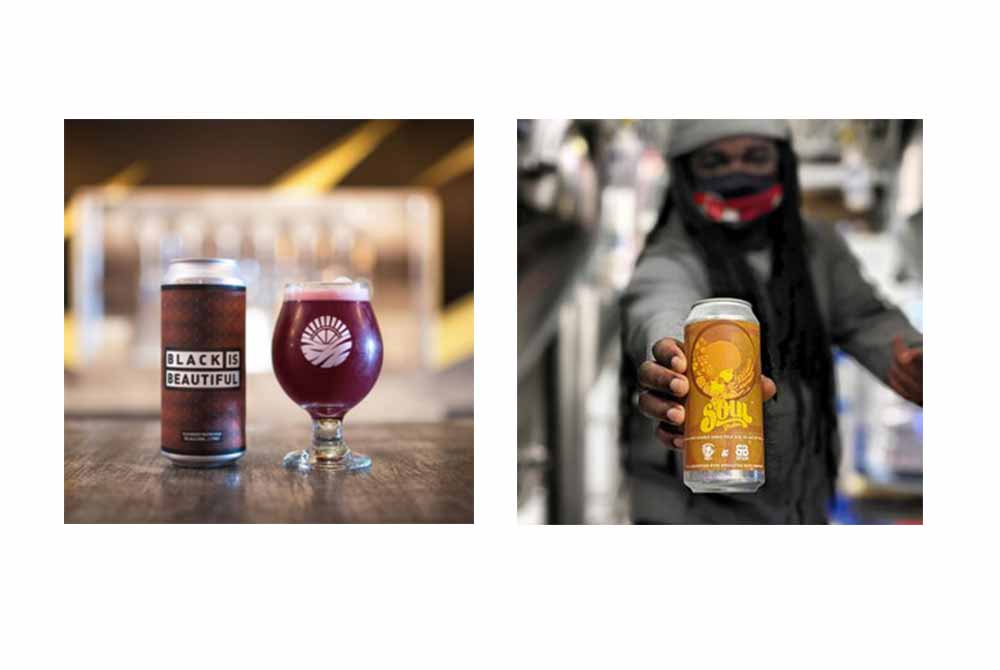
Photography courtesy of Brockton Beer Company
On Martin Luther King Day ‘21, for instance, the guys went to Widowmaker in Braintree to brew Soul Maker, a DIPA eventually released during Black History Month. In July of 2020, as part of Weathered Souls’ Black is Beautiful campaign, they made a blackberry fruited sour, topped off with a marshmallow kiss, with Vitamin Sea. Both beers express Black identity and Black culture in the way they relate to Black American history (in the case of Soul Maker) as well as contemporary injustices done against Black Americans (in the case of Black is Beautiful).
But, the path hasn’t always been easy.
The Societal Obstacles Facing Brockton Beer Company’s Journey
Stresses are common in craft brewing, but are certainly exacerbated for breweries owned and operated by people of color: African-American, Haitian, Dominican, Jamaican, Puerto Rican, and Filipino. They’ve encountered their share of systemic roadblocks, from mere nuisances to actual offenses, along the way, skepticism, which Alexandre thoughtfully refrains from qualifying as racism. “When we approach people to say, ‘Hey, we’re going to do this thing,’ it’s always met with ‘What do you know about this? What do you know about craft beer? What do you know about business? What do you know about…’ You name it,” he says. Incredulity isn’t just a white reaction, either. “We get it from Black people, we get it from, put a race on it,” Alexandre says. “It isn’t inherently because we’re Black, but maybe it is. I’m not here to make those calls.” All he and the rest of the crew can say for sure is that the very idea of a Black-owned brewery is met with raised eyebrows.
“Of the things I’ve heard, one of my favorites is ‘Black people don’t drink beer,’” says Olmstead. The attitude he speaks of likely stems in part from the perception of craft beer as a white bro’s world. Frankly, that perception isn’t totally unfounded – white bros are as critical to a brewery’s infrastructure as brew kettles – but it remains exclusionary and unfair nonetheless.
But while that kind of baffled prejudice is tiresome, it plays to Brockton Beer Company’s advantage as a brewery that’s representative of its community. “Everybody sees a face in our group that they may or may not feel comfortable with, but they always see somebody that they are comfortable with,” Olmstead adds. Eventually, they’re going to gravitate toward people they’re less comfortable with, or they’ll run into Silvera, Cabellon, or Alexandre, and they’ll feel comfortable, because to spend time with Brockton Beer’s founders is to feel welcomed. That’s a big part of the experience they want customers to have once their brewery is up and running; another important component, says Silvera, is education, “bringing people into the brewery who may not be used to what craft beer is – they love beer, but they just haven’t had craft beer – and introducing them to new things.”
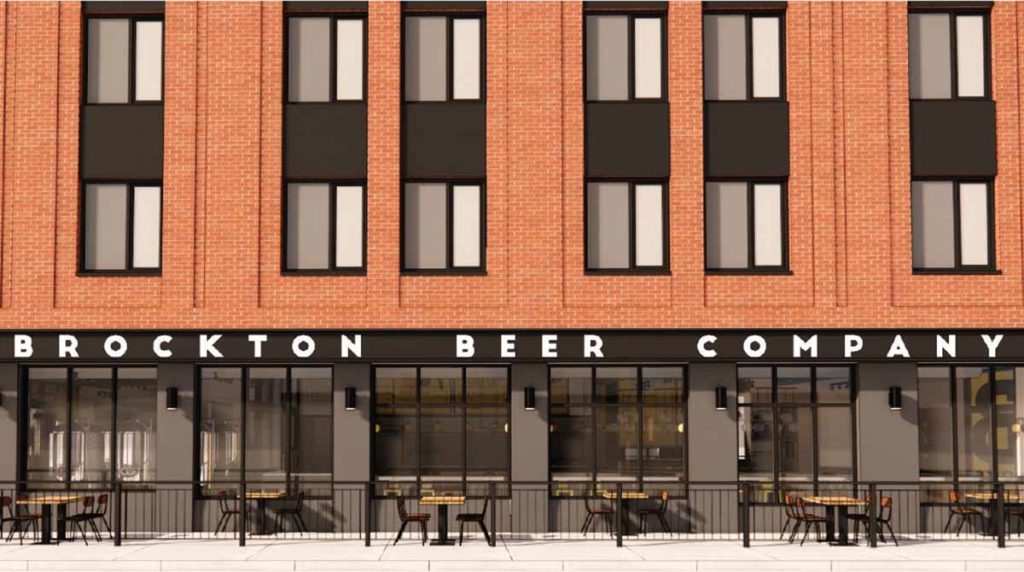
Photography courtesy of Brockton Beer Company
Despite the Challenges, Brockton Beer Company Continues To Grow
Brockton Beer Company’s buildout in the City of Champions is taking a whole lot of time, the chief material needed to open up a brick and mortar establishment, but the BBC team has used that time to stake a claim and build a name in digital spaces. “It’s helped us grow our brand and keep our brand top of mind as people get excited for our opening and see the things that we’re doing with other breweries” says Cabellon.
And Brockton Beer’s collab portfolio means to impress: Working together with Second Wind, Untold, Crue Brew, Vitamin Sea, Article XV, and Widowmaker, Brockton Beer has knocked out a healthy slate of collab beers ranging from fruited sours to double IPAs to imperial stouts to session NEIPAs. That’s range, and you can see the range expand by scrolling through BBC’s Instagram page.
Collaboration is a popular custom in craft beer of course, and every brewery necessarily has an Instagram page. But familiar as these practices are for countless craft breweries in the U.S., Brockton Beer’s foundations rest on Instagram more so than most; the app functions as both a branding tool and as a documentary feature, recounting the staggering amount of effort the crew has given to bring their vision to life. “Starting a brewery is hard,” says Silvera. “We’re going on year three. Once we get going, too, we know it’s going to be a grind, and we’re going to keep grinding.” Think of breweries as kids: There’s never a perfect time to have one, they cost a lot of money to raise, and supporting them only gets more stressful as they get older.
But in the end all the effort is worth it because Brockton Beer Company is a place where you can meet new people, try new beer styles, or taste new foods. And the brewery reflects its owners heritage through its beer, especially with Alexandre using African-sourced hops when possible. The Brockton Beer Company shows best that “new” means new perspectives coupled with a classic definition of what beer can be: Community.

